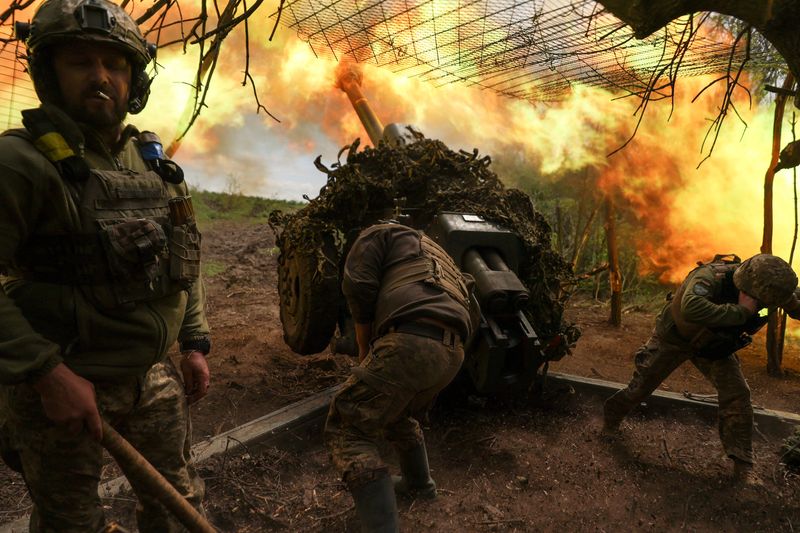By Mike Stone
WASHINGTON (Reuters) -The United States plans to send cluster munitions to Ukraine to help it battle Russian invaders, U.S. officials said on Thursday, a move opposed by human rights groups but which would provide a powerful new element to Ukraine's counteroffensive
A weapons aid package that includes cluster munitions fired by a 155 millimeter Howitzer cannon was expected to be announced as soon as Friday, said three U.S officials speaking on condition of anonymity. The measure has been under serious consideration for at least a week, one of the officials said.
The White House said sending cluster munitions to Ukraine is "under active consideration" but it had no announcement to make. President Joe Biden is to attend a NATO summit next week in Lithuania expected to be dominated by the war in Ukraine.
Human Rights Watch called on Russia and Ukraine to stop using cluster munitions and urged the U.S. not to supply them. The group said that both Russian and Ukrainian forces have used the weapons, which have killed Ukrainian civilians.
The munitions, banned by more than 120 countries, typically release large numbers of smaller bomblets that can kill indiscriminately over a wide area, threatening civilians. Bomblets that fail to explode pose a danger for years after a conflict ends.
A 2009 law bans exports of U.S. cluster munitions with bomblet failure rates higher than 1%, which covers virtually all of the U.S. military stockpile. Biden can waive prohibitions around the munitions as Trump did in January 2021 to allow the export of cluster munitions technology to South Korea.
Ukraine has urged members of Congress to press Biden's administration to approve sending cluster munitions known as Dual-Purpose Conventional Improved Munitions (DPICM).
$800 MILLION PACKAGE
A Pentagon spokesman said the Biden administration was considering sending DPICMs to Ukraine, but only those that had a failure rate lower than 2.35%.
The U.S. military believes cluster munitions would be useful for Ukraine, a senior Pentagon official said in June, but they had not been approved for Kyiv yet because of congressional restrictions and concerns among allies.
The U.S. Army is currently spending more than $6 million a year to decommission 155 millimeter cluster artillery shells and other older munitions, according to budget documents. Sending DCIPMs would ease a drain on standard 155 millimeter shells that Washington has been shipping to Kyiv in massive quantities.
Also in the aid package to be announced, which is expected to be worth as much as $800 million, Ukraine will receive munitions for High Mobility Artillery Rocket Systems (HIMARS), and ground vehicles such as Bradley fighting vehicles and Stryker (NYSE:SYK) armored personnel carriers, the officials said.
The package was still being finalized and could change, the officials said. It would be funded using Presidential Drawdown Authority, which authorizes Biden to transfer articles and services from U.S. stocks without congressional approval during an emergency. The material will come from U.S. excess inventory.
The security assistance package would be the 42nd approved by the United States for Ukraine since the Russian invasion in February 2022, for a total of more than $40 billion.
Ukraine has also been pushing for new Western fighter planes, including F-16s, as it pursues its counteroffensive.

"F-16 or any other equipment that we do need will give us an opportunity to move faster, to save more lives, to stand our ground for a longer time," Ukrainian President Volodymyr Zelenskiy said in an ABC News interview broadcast on Thursday.
NATO members Denmark and the Netherlands are leading efforts by an international coalition to train pilots and support staff, to maintain aircraft and ultimately supply F-16s to Ukraine.
